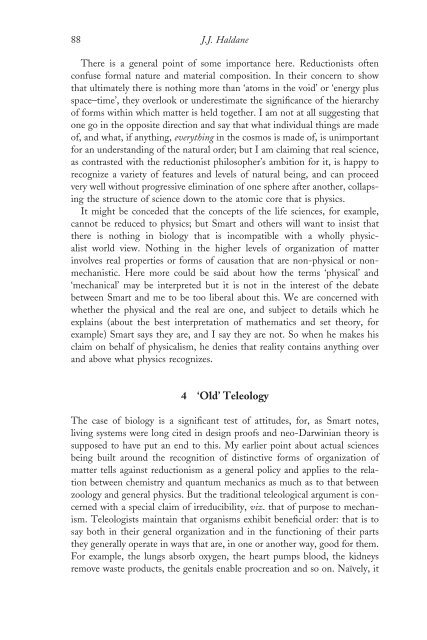Atheism and Theism JJ Haldane - Common Sense Atheism
Atheism and Theism JJ Haldane - Common Sense Atheism
Atheism and Theism JJ Haldane - Common Sense Atheism
You also want an ePaper? Increase the reach of your titles
YUMPU automatically turns print PDFs into web optimized ePapers that Google loves.
88 J.J. <strong>Haldane</strong><br />
There is a general point of some importance here. Reductionists often<br />
confuse formal nature <strong>and</strong> material composition. In their concern to show<br />
that ultimately there is nothing more than ‘atoms in the void’ or ‘energy plus<br />
space–time’, they overlook or underestimate the significance of the hierarchy<br />
of forms within which matter is held together. I am not at all suggesting that<br />
one go in the opposite direction <strong>and</strong> say that what individual things are made<br />
of, <strong>and</strong> what, if anything, everything in the cosmos is made of, is unimportant<br />
for an underst<strong>and</strong>ing of the natural order; but I am claiming that real science,<br />
as contrasted with the reductionist philosopher’s ambition for it, is happy to<br />
recognize a variety of features <strong>and</strong> levels of natural being, <strong>and</strong> can proceed<br />
very well without progressive elimination of one sphere after another, collapsing<br />
the structure of science down to the atomic core that is physics.<br />
It might be conceded that the concepts of the life sciences, for example,<br />
cannot be reduced to physics; but Smart <strong>and</strong> others will want to insist that<br />
there is nothing in biology that is incompatible with a wholly physicalist<br />
world view. Nothing in the higher levels of organization of matter<br />
involves real properties or forms of causation that are non-physical or nonmechanistic.<br />
Here more could be said about how the terms ‘physical’ <strong>and</strong><br />
‘mechanical’ may be interpreted but it is not in the interest of the debate<br />
between Smart <strong>and</strong> me to be too liberal about this. We are concerned with<br />
whether the physical <strong>and</strong> the real are one, <strong>and</strong> subject to details which he<br />
explains (about the best interpretation of mathematics <strong>and</strong> set theory, for<br />
example) Smart says they are, <strong>and</strong> I say they are not. So when he makes his<br />
claim on behalf of physicalism, he denies that reality contains anything over<br />
<strong>and</strong> above what physics recognizes.<br />
4 ‘Old’ Teleology<br />
The case of biology is a significant test of attitudes, for, as Smart notes,<br />
living systems were long cited in design proofs <strong>and</strong> neo-Darwinian theory is<br />
supposed to have put an end to this. My earlier point about actual sciences<br />
being built around the recognition of distinctive forms of organization of<br />
matter tells against reductionism as a general policy <strong>and</strong> applies to the relation<br />
between chemistry <strong>and</strong> quantum mechanics as much as to that between<br />
zoology <strong>and</strong> general physics. But the traditional teleological argument is concerned<br />
with a special claim of irreducibility, viz. that of purpose to mechanism.<br />
Teleologists maintain that organisms exhibit beneficial order: that is to<br />
say both in their general organization <strong>and</strong> in the functioning of their parts<br />
they generally operate in ways that are, in one or another way, good for them.<br />
For example, the lungs absorb oxygen, the heart pumps blood, the kidneys<br />
remove waste products, the genitals enable procreation <strong>and</strong> so on. Naïvely, it

















